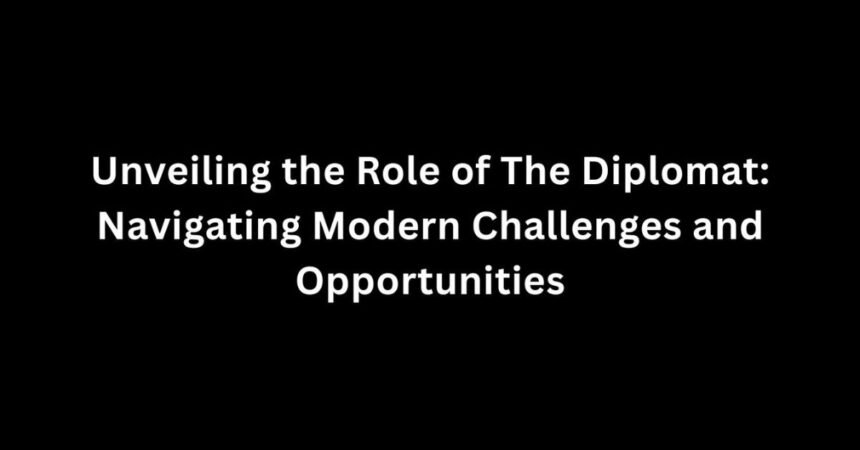The world of diplomacy is intricate, multifaceted, and pivotal to the preservation of international relations. At its heart lies the concept of “The Diplomat”—a figure that embodies the art and science of negotiation, representation, and international collaboration. In this blog post, we will explore the essence of what it means to be a diplomat, the various roles they play, historical and contemporary insights, challenges faced by diplomats today, and the future of diplomacy in an increasingly interconnected world. Whether you are a student of international relations, a curious reader, or someone interested in global affairs, this exploration of The Diplomat will provide a comprehensive overview of this essential profession.
The Role of a Diplomat
A diplomat functions as a representative of their home country, serving a range of purposes that are vital for maintaining constructive international relations. The role of a diplomat can be broken down into several key areas:
- Representation: Diplomats represent their countries abroad at various levels. This includes leading formal negotiations, attending international conferences, and engaging with local governments.
- Negotiation: At the heart of a diplomat’s job is negotiation, whether it’s about trade agreements, peace settlements, or environmental treaties.
- Reporting: Diplomats are tasked with assessing political, economic, and social developments in their host country and providing comprehensive reports back to their home governments.
- Consular Services: In addition to political activities, diplomats often oversee consular services to assist citizens abroad, provide visas, and ensure the welfare of nationals in foreign countries.
- Cultural Diplomacy: Diplomats often promote cultural exchange to foster goodwill and understanding between countries, which can include educational exchanges, cultural festivals, and art exhibitions.
History of Diplomacy
The history of diplomacy dates back to ancient civilizations. Early instances of diplomatic practice can be found in Egypt, Greece, and Rome, where emissaries would be sent to negotiate treaties or alliances. However, the modern diplomatic system we see today took shape in the 17th century during the Peace of Westphalia, which ended the Thirty Years’ War in Europe.
Throughout history, there have been pivotal moments that shaped diplomatic relations:
- The Congress of Vienna (1814-1815): This meeting of European powers restored balance after the Napoleonic Wars, marking the birth of modern diplomacy.
- Creation of the League of Nations (1920): Following World War I, the League aimed to ensure peace through dialogue and collective security, setting a precedent for future international organizations.
- Formation of the United Nations (1945): Established post-World War II, the UN symbolized a global effort to prevent conflict and promote cooperative international governance.
Types of Diplomats
Not all diplomats are created equal; they can be categorized by their functions, responsibilities, and relationships with their home country. The following are key types of diplomats you should know:
- Ambassadors: The highest-ranking diplomats, ambassadors oversee embassies and act as the primary representatives of their country in a foreign nation.
- Consuls: Consuls focus on protecting the interests of their citizens abroad, often dealing with visa applications and citizen services.
- Chargés d’Affaires: Acting in place of an ambassador when they are absent, chargé d’affaires maintain embassy functions and represent their country.
- Special Envoys: These diplomats are appointed for specific missions or issues, such as peace negotiations or humanitarian crises.
Challenges Faced by Modern Diplomats
Today’s diplomats face a complex array of challenges shaped by evolving global dynamics. Here are some of the most pressing issues:
- Geopolitical Tensions: Rising tensions between major powers, such as the US-China relations, and events like the Ukraine crisis place immense pressure on diplomats to navigate conflict resolution.
- Globalization: The interconnected nature of global economies and cultures complicates diplomatic relations, requiring diplomats to deal with transnational issues like climate change and cyber security.
- Public Diplomacy: Engaging the public and utilizing social media for outreach is becoming essential, as citizens increasingly influence international perceptions and policies.
- Health Crises: The COVID-19 pandemic demonstrated how global health can impact diplomacy, with diplomats needing to address travel bans, health protocols, and international cooperation for vaccine distribution.
Future of Diplomacy
As we look toward the future, the landscape of diplomacy is likely to continue evolving. Several trends are shaping the future of The Diplomat:
- Increased Focus on Climate Diplomacy: Environmental issues are emerging as a central theme, prompting diplomats to engage in negotiations around climate action and sustainability.
- Cyber Diplomacy: With the rise of cyber warfare and online security threats, diplomats will need to address these challenges through international agreements and norms.
- Shift Towards Multilateralism: As global issues often transcends national borders, there’s a movement towards multilateral cooperation, pushing for stronger international organizations.
- Inclusivity: Future diplomacy may see a more diversified representation of voices, including women, youth, and marginalized communities in diplomatic discussions.
Conclusion
The role of The Diplomat is as critical today as it has ever been. As we navigate the complexities of international relations and confront global challenges, diplomats serve as bridges between nations, contributing to peace, security, and collaboration. Understanding the vital functions they perform allows us to appreciate the art of diplomacy more profoundly. As we move into an ever-changing world, the effectiveness of diplomacy in addressing pressing global issues will not only define international relations but also shape the future of humanity.
Have you ever considered a career in diplomacy, or are you interested in global affairs? We invite you to share your thoughts in the comments below! Don’t forget to share this post on your social media channels, and feel free to explore more related articles on the importance of diplomacy in today’s society.
For additional insights on international relations and diplomatic practices, check out the United Nations, the World Bank, and an insightful article from Foreign Affairs.
